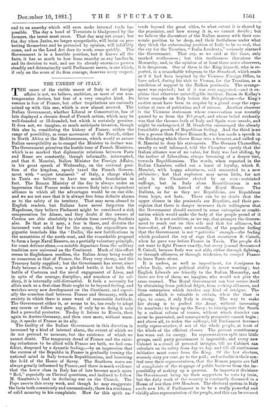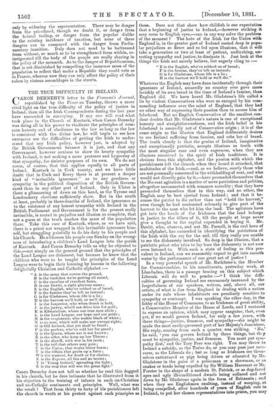THE UNREST OF ITALY.
THE cause of the visible unrest of Italy in all foreign affairs is not, we believe, ambition, as most of our con- temporaries declare, but fear of a very complex kind. Its essence is fear of France, but other trepidations are curiously mixed up with this one, which is now almost avowed. The Italian Government, whether Liberal or Conservative, has of late displayed a chronic dread of French action, which may be well-founded or ill-founded, but which is certainly genuine. It does not, we imagine, so much anticipate invasion, though this also is, considering the history of France, within the range of possibility, as some movement of the French, either in North Africa or the Mediterranean, which would so arouse Italian susceptibility as to compel the Ministry to declare war. The Government perceives the hostile tone of French Ministers, which is so marked that diplomatic relations between Paris and Rome are constantly, though informally, interrupted, and that S. Mancini, Italian Minister for Foreign Affairs, in his great speech of Wednesday, on the external posi- tion of the kingdom, openly taxed the French Govern- ment with " unjust treatment " of Italy, a charge which in Tunis we believe to have too much foundation in fact. The Roman Ministry of the day is always under an impression that France seeks to coerce Italy into a dependent alliance in which all the advantages would be on one side, and we are not sure that it is always free from definite alarms as to the safety of its territory. That may seem absurd to English readers, but Italians have never forgotten the Napoleons, they believe Piedmont might be considered a rich compensation for Alsace, and they doubt if the owners of Corsica are able absolutely to abstain from coveting Sardinia also. Be that as it may, a fear is there, and dictates the increased vote asked for for the army, the expenditure on gigantic ironclads like the Duilio,' the new fortifications in the mountains of the north-west, and the remarkable proposal to form a large Naval Reserve, on a partially voluntary principle, for coast defence alone,—a notable departure from the military tradition now universal on the Continent. Much of this effort seems to Englishmen needless, the Italian Army being nearly as numerous as that of France, the Navy very strong, and the Treasury fairly supplied ; but the Government has never, since Italy became a State, won a pitched battle, it lost both the battle of Custozza and the naval engagement of Lissa, and in spite of the courage, discipline, and numbers of its sol- diery, it is internally self-distrustful. It feels a necessity for allies such as a first-class State ought to be beyond feeling, and watches every new development on the Continent, and especi- ally the ceaseless duel between France and Germany, with an anxiety in which there is some want of reasonable fortitude. The Government either is, or seems to be, too ready to adopt any course or follow any policy, if only by so doing it may find a powerful protector. To-day it listens to Russia, then again to Austro-Germany, and then once more, without warn- ing, it speaks of France as its ally.
The facility of the Italian Government in this direction is increased by a kind of internal alarm, the extent of which we do not pretend to measure, but the existence of which we cannot doubt. The temporary dread of France and the exist-
ing reluctance to be allied with France are both, we feel con- fident, deepened by a dynastic feeling,—by an impression that the success of the Republic in France is gradually turning the national mind in Italy towards Republicanism, and loosening the hold of the House of Savoy. The Southern races are always greatly influenced by France, and there is much evidence that the lower class in Italy has of late become much more " Red," especially on Clerical questions, and inclined to follow M. Gambetta's lead in declaring war on the Church. The Pope asserts this every week, and though he may exaggerate the facts both consciously and unconsciously, there is a residuum of solid meaning in his complaints. How far this spirit ex- tends beyond the great cities, to what extent it is shared by the peasantry, and how strong it is, we cannot decide ; but we believe the discontent of the Italian masses with their eco- nomic position to be deep, and their fretfulness under what they think the unbecoming position of Italy to be so real, that the cry for the Treutino, " Italia Irredenta," seriously alarmed the Government. That cry, as we said at the time, only marked restlessness ; but this restlessness threatens the Monarchy, and, in the opinion of at least three acute observers, it is dangerous. One of these is the King himself, who is re- ported, in a remarkable telegram to the Standard, which reads as if it had been inspired by the Viennese Foreign Office, to have asked, during his visit to Vienna, for the Trentino, as a condition of support in the Balkan peninsula. The arrange- ment was rejected ; but if it was ever suggested—and it ex- plains that otherwise unintelligible incident, Baron de Kallay's bitter remarks on Italy before the Delegations—the King's motive must have been to acquire by a grand coup the repu- tation at once of patriotism and of success. Another observer is the Viennese statesman whose conversation was recently quoted by us from the Tel, graph, and whose belief evidently was that the thrones both of Italy and Spain were unsafe, and might be endangered, if M. Gambetta encouraged the already formidable growth of Republican feeling. And the third is no less a person than Prince Bismarck, who has made a speech in the Reichstag which threw Rome into a ferment, and called up S. Mancini to deny his statements. The German Chancellor, usually so well informed, told the Chamber openly that the Italian alliance was of no value, for Italy was fast sliding, by the incline of Liberalism, always becoming of a deeper tint, towards Republicanism. The words, when repeated in the Italian Chamber, called out a burst of loyalty, which S. Mancini, with happy adroitness, said amounted to a new plebiscite ; but that explosion may mean little, for not only is the Chamber elected by an over - restricted suffrage, but in Italy alone Republicanism is not mixed up with hatred of the Royal House. The Italians, so far as they are Republican, are Republican
from hope, not hate. There can be no doubt that the upper classes in the peninsula are Royalists, and their per- ception that there is danger increases their willingness that the Government should succeed in some enterprise or combi- nation which would make the body of the people proud of it again. It is not ambition, as we say, that prompts the Govern- ment to reach out on this side and that for alliances, but fear—first, of France, and secondly, of the popular feeling that the Government is not " patriotic " enough—the feeling which produced the cry of rage that overthrew S. Cairoli, when he gave way before France in Tunis. The people did not want to fight France exactly, but every journal denounced S. Cairoli, because Italy was not able, either through fighting, or through alliances, or through trickeries, to compel France to leave Tunis alone.
It is useless, as well as impertinent, for foreigners to advise Italy, where political ability is never wanting ; but English Liberals are friendly to the Italian Monarchy, and there are few of them, we imagine, who would not give the same counsel. The Royal Government can best secure itself by abstaining from political fidget, from seeking alliances, and from enterprises which involve any kind of intrigue. The alliance which is valuable is certain, when the time is ripe, to come, if only Italy is strong. The way to make her strong is to perfect the Army, without increasing its numbers ; to keep up the Navy ; to reinvigorate the South by a radical reform of tenure, without which disorder can never be prevented, and consequently prosperity cannot begin ; and above all, to widen the suffrage, till Parliament becomes really representative, if not of the whole people, at least of the whole of the efficient classes. The present constituency has worn out its energy. Its representatives split into little groups, until party government is impossible, and every new Cabinet is a result of personal intrigue, till no Cabinet can calculate on its safety from day to day, and till all continuous initiative must come from the King. OF the few electors, scarcely sixty per cent. go to the poll ; and so feeble is their con- trol over their representatives, that the Roman papers are full of complaints of the stoppage of public business from the im- possibility of making up a quorum. In important divisions the Government bring up their supporters to vote by train, but the daily work of the country is constantly discussed in a House of less than 100 Members. The electoral system in Italy needs new life, if Parliament is to be a really powerful and vividly alive representation of the people, and this can be secured only by widening the representation. There may be danger from the priesthood, though we doubt it, or danger from the federal feeling, or danger from the popular dislike to the existing incidence of taxation, but none of these dangers can be compared with the danger from Parlia- mentary inanition. Italy does not need to be buttressed from without, so much as to be strengthened from within, re- invigorated till the body of the people are really sharing in the policy of the monarch. As to the danger of Republicanism, that is not diminished by compelling the immense mass of the population to reflect that under a Republic they could vote as in France, whereas now they can only affect the policy of their rulers by riotous assemblages in the streets.







































 Previous page
Previous page